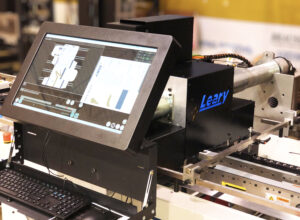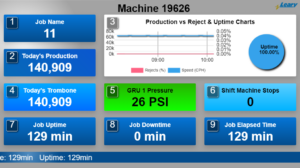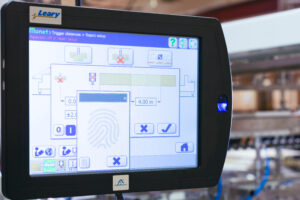
1. What are some recent advancements introduced in the last five years for quality control systems on folder-gluers for cartons and microflute?
Many of Leary’s advancements in the area of quality control are in response to our customers’ requests to adapt to changing needs of the paperboard packaging market. Greater quality demands, new and innovative paperboard packaging designs as an alternative material and a shift towards increased eCommerce retail, have customers looking for ways to improve their folder gluers delivering drastic results.
Leary’s In-Line Diverter ejection system is an upgrade which removes faulty product in a way comparable to the OEM supplied rejection devices on new machines. For older folder gluers, the only automated rejection devices available removed product by pulling it out from the side of the machine. While this method is viable for some applications, carton styles such as 4-corner, larger or irregular shape can easily create jams when many cartons are rejected together for a line clearance. The In-Line diverter is the only retrofit solution that pushes the cartons down from the machine, eliminating any carton style or size impediments, offering improved machine uptime because setup is virtually nil. Ejectors that remove cartons from the side require precise mechanical positioning and setup and the associated skill level to use them successfully at todays increased speeds is eliminated with the In-Line Diverter.
Advancements and acceptance of camera technology is also evident with an increase in use for a range of QA applications on the folder gluer. Monitoring for multiple defects at a single location and a wider field of view are advantages of camera technology. The LearyVIEW range of cameras includes options for inspection of glue and non-glued areas, flaps and folds, labels, inserts, Braille and full carton print quality inspection. Leary’s print inspection solution is a unique inline retrofit option which installs after the existing folder gluer aligning section and requires only 450 mm (18 in) to integrate to almost any make and model machine. This widely used solution meets the demands of customers requiring the highest level of quality, with Delta-E color inspection, optical character recognition and automated setup from a pre-press PDF to deliver flawless print and registration at speeds up to 400 m/min (1300 ft/min).
Creating products that are more automated and removing human touch points are increasingly being requested, consideration for this is key in all new product developments. Many of the new software features available in Monet 2.12, are developed as a result of Leary applying their expertise and thorough understanding of the folding carton processes, are a response to these customer demands.

2. What has changed over the years (such as shorter runs, more setups, customer requirements, etc) making these systems even more important?
The demand for increased automation in the carton production process has made technologically advanced QA systems more important – there are simply less people in the process to find potential quality problems. As carton manufacturers work to increase sustainability efforts – decreasing waste and improving efficiencies, they are also facing workforce challenges. Previously, operators with a strong level of expertise focused on each machines output, controlling all aspects of production including quality, machine stops and lengthy startups. Plants relied on personnel skill; carton manufacturers increasingly find these skills difficult to recruit for and the risk of human error impacting quality has increased significantly. Quality systems that are easy-to-use and can automate multiple areas of operation, not only find and reject bad product, but to inform manufacturers of the root cause of production issues will succeed.
Leary’s Monet software user interface drastically reduces training needed as evident with the simple and quick New Job Setup. Using carton style intel and machine learning, there are less pages and less button pushes needed to deliver quick and efficient startups.
The latest Monet release also features a more secure approach to maintaining carton quality and eliminating human error for repeat jobs by storing defined best-practice settings as a default. Pertinent variables, consistent from job to job are protected from operator changes, when exceptions are needed these changes are easily made through a password retrieval system that generates a unique short-term password for log-in privileges. Changes are recorded, and at the end of the production run Monet defaults these settings back to the original, ready for the next run thus preserving the baseline setup for the future.
Leary’s iQ Alerts cloud-based notification system also bridges the personnel gap, ensuring all production lines are running at the desired speeds and quality levels. This technology allows each user to receive customized SMS or email messages to their phone or smart watch when production deviates from the set criteria, often time impeding on quality or delivery goals. These alerts can include an increase in rejects, alarms being turned off, product mixes being detected and machine downtime exceeding limits. This allows users who are not next to the machine, stay informed in real-time and take immediate action to resolve problems.
Large flat screen graphical production displays have recently been added to Leary’s range of visual management products. Along with programmable multi-color beacons, that immediately alert production personnel that something has changed or out of specification, these customizable flat screen displays, fitted above each machine, include further detail about downtime, spoilage, production counts and more.

3. What questions should converters be asking suppliers before investing in a quality control system for folder-gluers?
Ease-of-use and simple setup is obviously very important to converters. Software should be intuitive and guide the operator in a logical way through the process with clear and simple feedback. The supplied hardware should be flexible and easy to position correctly, robustly designed and with few adjustments necessary.
But when purchasing a quality control system, it is important to look for a supplier with whom you can create a long-lasting relationship. Quality needs change over time as new jobs are taken on and new customers gained, that ongoing process requires a supplier with a broad product portfolio. The ability to combine sensor and camera technologies for specific applications, offer solutions that improve folder gluer machine efficiency and the ability of the software interface to control these automated functions are all important. Product development from any supplier should include these latest technologies.
Equally important is the in-depth application knowledge to assist with both todays and future needs. This level of expertise needed to deliver quality product in an efficient and sustainable way is vital as implementing a new solution to a current production process can be challenging. Having a knowledgeable, dedicated after-sales service and support team will make all the difference. The production environment is filled with variables that can impede product quality and delivery; new job requirements, substrate alterations, personnel changes, shorter delivery times, delayed materials, demands for improved efficiency are all inevitable over time and a reliable supplier will offer consistent, timely and solution-orientated support, every time.

